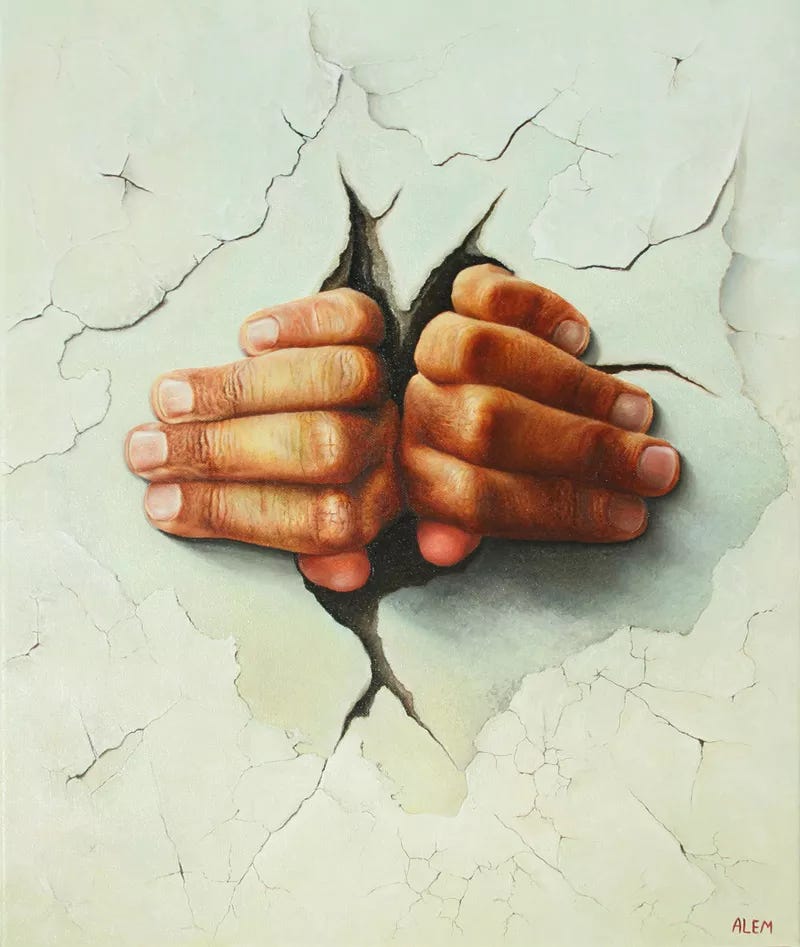Wait! Just Listen is a weekly Sunday newsletter on living a purposeful and meaningful life, in a digitised world of opinion polarisation, gratuitous commentary and click-bait. Subscribe with one-click to receive my musings right in your inbox.
Within the narrow confines of our being, nothing appeals to us more than freedom; an intoxicating aspiration we idealise to counter the slew of reminders that perhaps we are not as free as we think. Freedom has long become an ally of modern day ideological sophistry; the carrot at the end of the neo-liberal stick, dangled by the obscenely powerful to win the favour of a an increasingly disillusioned public. But beyond being a currency for lip-service, what does freedom actually mean?
British philosopher, Iris Murdoch, once argued that we are least free when confined to the trap of the self. She contends that our pesky ego, stymies our ability to absorb the nectar of life outside of our own perspective. Even some 23 years later, her words have an immeasurable salience.
We are living in a landscape where empathic imagination has been eclipsed by the recursive self-reference of the human ego. Just look at our social media feeds and the dizzying carousel of reality TV shows. Ultimately, there seems to be a fundamental lack of attention on what it means to be interested in something other than oneself. Put in another way, there is a narrative of the self that continues to hover over much of our existence, one that instigates a series of self-initiated post-mortems on what we should have done or could have said in any given circumstance.
This zealous reverence for the self and all its associated anxieties, prompted Murdoch at the time, to advocate for unselfing; a term deftly coined in her 1970 masterpiece, “The Sovereignty of Good”, a book with an unusual blend of spirituality and grounded philosophy, painted in lush resins of metaphors and teeming ruminations.
Unselfing requisites us to step outside of the self, and walk beside it with non-judgemental curiosity, acknowledging the infinite other ‘selves’ that have trod on similar and different paths to our own.
With sublime lyricism, Murdoch recollects an experience of peering out of a window whilst being clamoured by anxious thoughts, or as she puts it, “brooding perhaps on some damage done to my prestige”. She spots a hovering kestrel. In that singular languorous moment, she undergoes a triumphant transformation, where the crippling weight of her anxiety disappears and a wide-eyed wonder transmutes into her being, freed from the clasps of her nagging thoughts. The full presence of the kestrel is revealed.
For Murdoch, her serendipitous communion with nature provided the perfect occasion for ‘unselfing’. She writes:
I am looking out of my window in an anxious and resentful state of mind, oblivious of my surroundings, brooding perhaps on some damage done to my prestige. Then suddenly I observe a hovering kestrel. In a moment everything is altered. The brooding self with its hurt vanity has disappeared. There is nothing now but kestrel. And when I return to thinking of the other matter it seems less important. And of course this is something which we may also do deliberately: give attention to nature in order to clear our minds of selfish care.
The takeaway from Murdoch’s words are clear. The moral life begins with the fundamental act of seeing. It is an undiluted and loving attention to reality that frees the self from its prison house of illusion. An ideal life, for Murdoch, involves forging a fruitful distance from our storied self and its accompanying mist of doubts and dilemmas. Because it is through this difficult separation that the first taste of freedom is experienced, a freedom to discover beauty in everything.
Murdoch’s sagacious reflections on unselfing, encourages us to step out of our addictive relationship with the self, to feel the thud of paradoxes and dualities that resonate within our soul. To allow life’s anxieties to pucker our skin. To allow some blood to trickle. To allow some scars to heal. To allow freedom.
Before I end today, here are a few reads that I’ve found particularly reinvigorating with a piping hot Sunday morning coffee. For those of you that know my reading habits, I’m brutally selective of what I read because there is so much out there and so little time to absorb them all - to proffer them with the attention they duly deserve. So take the following list as a hand-curated offering of words that evoke and stir the soul in a really special way.







Unselfing is a great word. And the ultimate outcome of unselfing is not losing the self, but seeing the self with wiser eyes. I find it humorous that I can behold wonder similar to the kestrel moment then be sucked back into obsession of self, over and over again. I say humorous when wonder saturates my inner vision. Things are not so funny when I'm whipped up in a tornado of narrow perspective of self. There is a saying I've heard many times, though I don't know the source, which says, "God is playing hide and seek with itself."
Somewhat synchronous reading this - I’ve been mulling over ‘freedom’ (specifically from a feminist perspective) for part of a paper I’m giving at a conference and this morning I was reading something to feed the soul - these two streams I saw as separate avenues of thought... until I read your words. Thank you - I have even more to contemplate now.